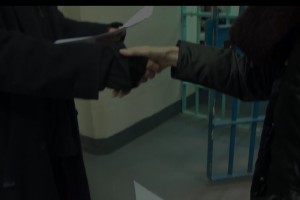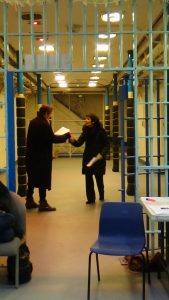Led by the Research Associate for Shakespeare and his Sisters on Site, Imogen Felstead.
Imogen Felstead is a PhD student at Lancaster University researching the hand in early modern drama.

Hands speak silently but commandingly. They can express emotion, be raised in supplication, clasped in prayer or clenched in anger. Hands can communicate our humanity or empathy as they make a physical contact. By using two excerpts from Measure for Measure the workshop was divided into two and split into pairs asked to introduce themselves by shaking hands with their partner.
The first group focused on and acted the Duke’s handshake with Angelo in Act I Scene I:
(I, i) Vincentio. My haste may not admit it;
Nor need you, on mine honour, have to do
With any scruple; your scope is as mine own
So to enforce or qualify the laws
As to your soul seems good. Give me your hand:
I’ll privily away. I love the people,
But do not like to stage me to their eyes:
Through it do well, I do not relish well
Their loud applause and Aves vehement;
Nor do I think the man of safe discretion
That does affect it. Once more, fare you well.
The second group focused on and acted the Duke’s request for Isabella’s hand in Act V Scene I:
(V, i) Vincentio. O, your desert speaks loud; and I should wrong it,
To lock it in the wards of covert bosom,
When it deserves, with characters of brass,
A forted residence ‘gainst the tooth of time
And razure of oblivion. Give me your hand,
And let the subject see, to make them know
That outward courtesies would fain proclaim
Favours that keep within. Come, Escalus,
You must walk by us on our other hand;
And good supporters are you.
As my research explores the request ‘give me your hand’ is very common between men as a symbol of bonding, however, between men and women, the gesture is very different as women’s hands are to be given by men. By utilising the space of A Wing in Lancaster Castle the pairs acted out the scenes and were able to differentiate the masculine authoritative handshake between Angelo and the Duke in Act I Scene I in direct contrast to the act of betrothal in Act V Scene I. Using the haunting space of the prison to turn away into the cells or use the bars of the prison to shut themselves in with the Duke’s open hand in theirs, members of the workshop could direct their own ending to the play.

Imogen Felstead (i.felstead1@lancaster.ac.uk)
You must be logged in to post a comment.